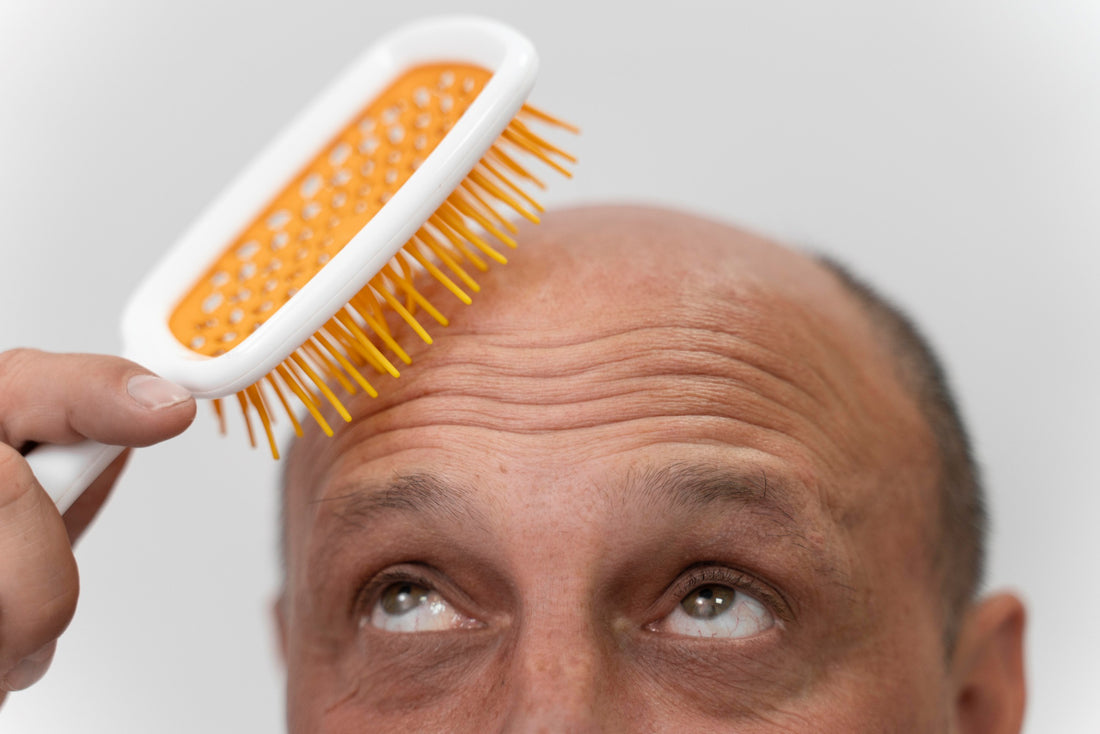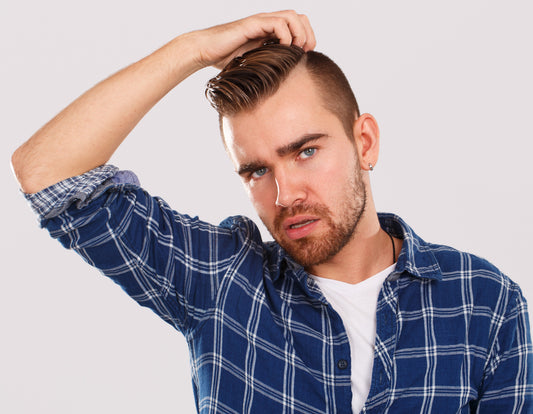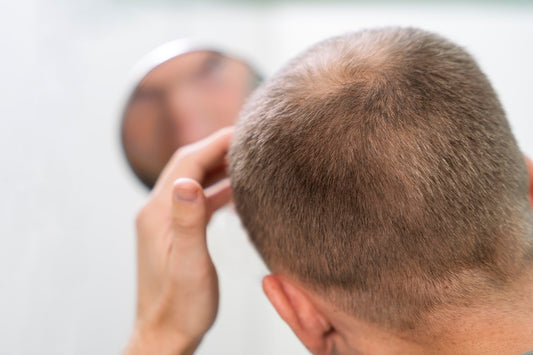Aging is an inescapable fact of life that we must all face at some point, and as we age, our bodies undergo numerous changes - some more visible than others.
One of these noticeable changes is the state of our hair. Hair loss is a common concern for both men and women, and the topic often carries a negative connotation, as it is associated with aging, a decline in appearance, and overall health.
This guide aims to explore possible causes, preventive measures, and effective supplements for hair loss, aiming to provide a comprehensive resource for anyone interested in maintaining healthy hair as they age.
Common Causes of Hair Loss
There are several possible causes for hair loss, including but not limited to:
- Genetics: The most common cause of hair loss is androgenetic alopecia, also known as male or female pattern baldness. It affects millions of people worldwide and is primarily determined by genetic factors.
- Hormonal Changes: Imbalances in hormone levels, such as during menopause and pregnancy, can lead to temporary or permanent hair loss.
- Medical conditions: Some medical conditions, such as thyroid disorders, scalp infections, and autoimmune diseases like alopecia areata, can cause hair loss.
- Medications and treatments: Certain drugs, including chemotherapy, radiation therapy, and medications for high blood pressure, heart problems, and arthritis, can lead to hair loss as a side effect.
- Stress: Physical or emotional stress can trigger temporary hair loss, usually noticed as thinning or shedding.
- Nutritional deficiencies: A lack of essential nutrients, such as iron, zinc, and protein, can lead to hair loss.
Factors Contributing to Hair Loss in the Aging Process
Aging brings with it various changes in our bodies, including hair loss. Several factors contribute to this phenomenon, some of which are within our control while others are not.
Understanding these factors can help in adopting measures to potentially mitigate hair loss.
1. Genetics
At the top of the list is heredity. Genetically predisposed hair loss, known as androgenetic alopecia or male and female pattern baldness, is the most common cause.

This type of hair loss results from a combination of hormones and genetic factors determining hair follicle sensitivity.
2. Nutritional Deficiencies
A balanced diet is crucial for maintaining healthy hair. Deficiencies of essential nutrients, such as iron, zinc, protein, and vitamins, can lead to hair loss. Ensuring an adequate intake of vital nutrients can positively impact hair growth and strength.
3. Hormonal Imbalances
Hormones play a significant role in hair health. Changes in hormonal levels, particularly during pregnancy, menopause, or as a result of thyroid disorders, can cause temporary or permanent hair loss.
Maintaining hormonal balance can help minimize hair fall linked to such causes.
4. Medical Conditions
Some medical conditions, such as scalp infections, autoimmune diseases (like alopecia areata), and thyroid disorders can contribute to hair loss. Treating the underlying medical condition often helps to restore hair growth and reduce hair loss.
5. Medications
Certain medications and treatments can cause hair loss as an unintended side effect. Some examples include chemotherapy, radiation therapy, and drugs prescribed for high blood pressure, heart problems, and arthritis.

Consulting with a healthcare professional about medication-induced hair loss can help determine if there are any alternatives available to minimize this side effect.
6. Stress and Lifestyle Factors
Both physical and emotional stress can trigger hair loss. Furthermore, lifestyle factors such as poor sleep, unhealthy dietary choices, and over-styling can also damage hair and lead to hair fall.
Managing stress and adopting a balanced lifestyle can help maintain overall hair health, preventing hair loss due to these factors.
Preventive Measures
Although some causes of hair loss may be beyond our control, there are preventive measures that can be taken to minimize the risk and maintain healthy hair:
- Eat a well-balanced diet, rich in vitamins, minerals, and proteins, to provide the essential nutrients your hair needs to grow and remain strong.
- Avoid over-styling and excessive use of heat tools, which can cause physical damage to the hair shaft and lead to hair breakage.
- Practice good scalp hygiene to prevent infections and dandruff, which can lead to hair loss.
- Limit exposure to harmful environmental factors, such as harsh sunlight, chemicals, and air pollutants.
- Try to manage stress, as it can contribute to hair loss. Engage in relaxation techniques and maintain a balanced lifestyle.
Effective Supplements
There are several supplements and natural remedies believed to promote hair health and reduce hair loss:
- Biotin: A B-vitamin that helps convert nutrients into energy, biotin is essential for maintaining hair, skin, and nails. It has been associated with increased hair growth and improved hair quality.
- Fish Oil: Rich in omega-3 fatty acids, fish oil supplements can help reduce inflammation and promote hair growth, as well as improve hair density.
- Vitamin D: Low levels of vitamin D have been linked to hair loss. Ensuring adequate vitamin D intake may help improve hair growth.
- Iron: Iron deficiency is a common cause of hair loss, particularly in women. Supplementing with iron can help improve hair growth, especially if a deficiency is present.
- Viviscal: A marine-based nutritional supplement, Viviscal has been shown to help promote hair growth and density in individuals with thinning hair.
Note: Before taking any supplements, always consult with your healthcare provider to ensure they are appropriate for your specific situation and to avoid potential interactions with other medications you may be taking.
Lifestyle Tips for Healthy Hair
In addition to the above measures, adopting a few lifestyle changes can help support hair health:
- Minimize chemical treatments: Regular use of chemical hair treatments, such as perms, relaxers, hair colors, and bleaches can weaken the hair shaft leading to hair breakage and loss. Limiting their use can keep your hair healthier.
- Gentle brushing: Be gentle when detangling your hair. Excessive force during combing or brushing can lead to hair breakage, contributing to hair thinning over time.
- Avoid tight hairstyles: Tight hairstyles such as ponytails, buns, and braids, can cause 'traction alopecia', a type of hair loss resulting from prolonged tension on the hair shaft. Opting for looser hairstyles can prevent this hair loss.
- Silk or satin pillowcase: Sleeping on a silk or satin pillowcase can reduce friction on the hair during the night, preventing hair breakage and promoting hair health.
- Stay hydrated: Proper hydration can promote healthier skin and hair. Dehydrated hair can become brittle and prone to breakage, leading to hair loss. Drinking adequate water can keep your hair hydrated and reduce hair fall.
When to See a Doctor
If you notice sudden, drastic, or persistent hair loss, or if you have concerns about your hair's overall health, it is important to consult a healthcare professional. They can help identify potential underlying causes, recommend appropriate treatments, and guide you in addressing any lifestyle factors that may be contributing to hair loss.
Conclusion
Hair loss can be a challenging part of growing older, but don't worry, there are ways to fight back. With the right steps and supplements, you can keep your hair healthy and even boost its growth.
Understanding what causes hair loss and creating good habits can put you in the driver's seat of your hair health. This lets you age with flair and self-assuredness.
Looking for a simple way to keep your hair strong and full? Try the Mohebi Life Natural Hair Support Supplement for Men. Just one capsule a day can bring you the power of our science-backed formula.
We handpicked nature's best, such as saw palmetto and pumpkin seed oil, and coupled them with advanced science. This blend supports healthy hair growth and strengthens the quality of your hair.
With Mohebi Life, a world of hair wellness is just around the corner.
FAQs
Q: How can I prevent hair loss during aging?
A: You can prevent hair loss by maintaining a healthy diet, limiting use of heat stylers and chemical treatments, and managing stress levels.
Q: What is the best vitamin for aging hair?
A: Vitamin D and B-vitamins, particularly Biotin, are critical for hair health and can combat hair loss as we age.
Q: What supplements stop hair fall?
A: Supplements such as Biotin, Fish Oil, Vitamin D, and Iron can help reduce hair fall and promote hair growth.
Q: What is the best treatment for age related hair loss?
A: Treatments for age-related hair loss vary, but Minoxidil (Rogaine) and Finasteride (Propecia) are FDA-approved treatments commonly used. Always consult a healthcare professional before starting any treatment.



